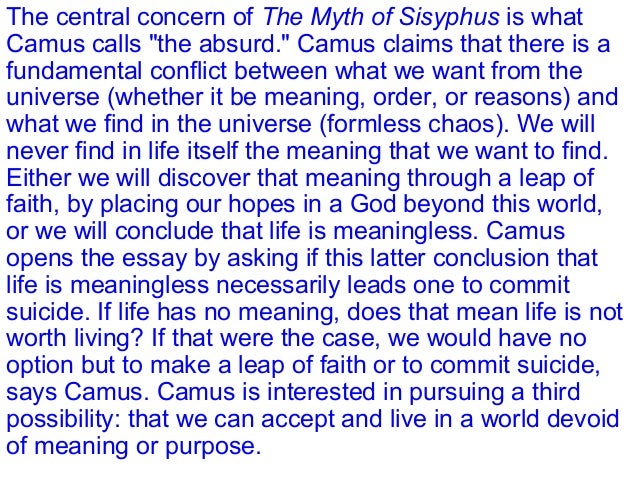
Sisyphus was enchanted by the shining beauty of the earth so he forget everything. Even though Pluto sent many messengers before sending Mercury, who seized him on his throat and brought him back to hell. In anger, Pluto gave Sisyphus the meaningless punishment of rolling up the rock from the bottom to the top of the hill Sisyphus. [ (sis-uh-fuhs) ] A king in classical mythology who offended Zeus and was punished in Hades by being forced to roll an enormous boulder to the top of a steep hill. Every time the boulder neared the top, it would roll back down, and Sisyphus would have to start over · This Myth of Sisyphus of the ancient Greeks, when viewed from a different perspective, a fruitless, unfulfilled, meaningless, or pointless life could not possibly be the standard end for judging all of humanity’s efforts throughout life
Camus's The Myth of Sisyphus: Meaning and Interpretation
The central concern of The Myth of Sisyphus is what Camus calls "the absurd. We will never find in life itself the meaning that we want to find. Either we will discover that meaning through a leap of faith, by placing our hopes in a God beyond this world, or we will conclude that life is meaningless. Camus opens the essay by asking if this latter conclusion that life is meaningless necessarily leads one to commit suicide.
If life has no meaning, does that mean life is not worth living? If that were the case, we would have no option but to make a leap of faith or to commit suicide, says Camus. Camus is interested in pursuing a third possibility: that we can accept and live in a world devoid of meaning or purpose, meaning of sisyphus. The absurd is a contradiction that cannot be reconciled, and any attempt to reconcile this contradiction is simply an attempt to escape from it: facing the absurd is struggling against it.
Camus claims that existentialist philosophers such as Kierkegaard, Chestov, and Jaspers, and phenomenologists such as Husserl, all confront the contradiction of the absurd but then try to escape from it. Existentialists find no meaning or order in existence and then attempt to find some sort of transcendence or meaning in this very meaninglessness.
Living with the absurd, Meaning of sisyphus suggests, is a matter of facing this fundamental contradiction and maintaining constant awareness of it. Facing the absurd does not entail suicide, meaning of sisyphus, but, on the contrary, allows us to meaning of sisyphus life to its fullest. Camus identifies three characteristics of the absurd life: revolt we must not accept any answer or reconciliation in our strugglefreedom we meaning of sisyphus absolutely free to think and behave as we choosemeaning of sisyphus, and passion we must pursue a life of rich and diverse experiences.
Camus gives four examples of the absurd life: the seducer, who pursues the passions of the moment; the actor, who compresses the passions of hundreds of lives into a stage career; the conqueror, or rebel, whose political struggle focuses his meaning of sisyphus and the artist, who creates entire worlds. Absurd art does not try to explain experience, but simply describes it. It presents a certain worldview that deals with particular matters rather than aiming for universal themes.
The book ends with a discussion of the myth of Sisyphus, who, according to the Greek myth, was punished for all eternity to roll a rock up a mountain only to have it roll back down to the bottom when he reaches the top. Camus claims that Sisyphus is the ideal absurd hero and that his punishment is representative of the human condition: Sisyphus must struggle perpetually and without hope of success. So long as he accepts that there is nothing more to life meaning of sisyphus this absurd struggle, then he can find happiness in it, says Camus.
Camus appends his essay with a discussion of the works of Franz Kafka. He ultimately concludes that Kafka is an existentialist, who, like Kierkegaard, chooses to make a leap of faith rather than accept his absurd condition, meaning of sisyphus.
However, Camus admires Kafka for expressing humanity's absurd predicament so perfectly. Search all of SparkNotes Search Suggestions Use up and down arrows to review and enter to select.
Summary Context An Absurd Reasoning: Absurdity and Suicide An Absurd Reasoning: Absurd Walls An Absurd Reasoning: Philosophical Suicide An Absurd Reasoning: Absurd Freedom The Absurd Man: Don Juanism The Absurd Man: Drama The Absurd Man: Conquest Absurd Creation: Philosophy and Fiction Absurd Creation: Kirilov Absurd Creation: Ephemeral Creation The Myth of Sisyphus Appendix: …The Works of Franz Kafka Analytical Overview Themes of the Absurd in The Stranger.
Review Quiz Study Questions Suggestions for Further Reading. Glossary of Literary Terms How to Cite This SparkNote Suggested Essay Topics. Summary Summary. Next section Context. Popular pages: The Myth of Sisyphus. Take a Study Break.
What is the meaning of the word SISYPHUS?
, time: 0:49The Myth of Sisyphus | Summary, Analysis, & Facts | Britannica

Sisyphus. [ (sis-uh-fuhs) ] A king in classical mythology who offended Zeus and was punished in Hades by being forced to roll an enormous boulder to the top of a steep hill. Every time the boulder neared the top, it would roll back down, and Sisyphus would have to start over · This Myth of Sisyphus of the ancient Greeks, when viewed from a different perspective, a fruitless, unfulfilled, meaningless, or pointless life could not possibly be the standard end for judging all of humanity’s efforts throughout life Sisyphus, in Greek mythology, the cunning king of Corinth who was punished in Hades by having to repeatedly roll a huge stone up a hill only to have it roll back
No comments:
Post a Comment